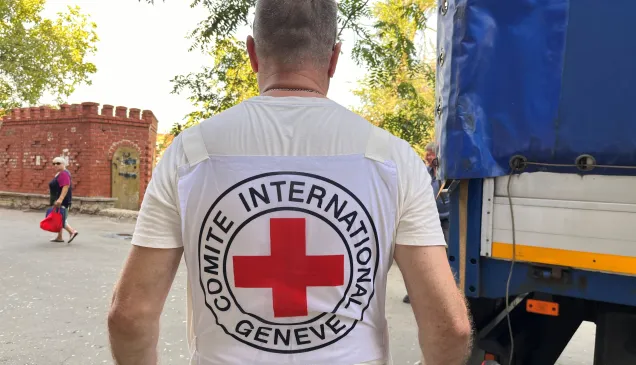Global Fund and ICRC join forces to enhance response to HIV, tuberculosis and malaria in conflict-affected areas
Geneva, 16 July 2018 – The Global Fund to Fight AIDS, Tuberculosis and Malaria (the Global Fund) and the International Committee of the Red Cross (ICRC) met Monday to announce a collaboration agreement focused on providing better care to individuals and communities burdened by these diseases in hard-to-reach conflict-affected areas and detention centres.
The Letter of Intent was signed by Yves Daccord, the ICRC director-general, and Peter Sands, the Global Fund Executive Director. It will see both organizations exchange knowledge and expertise, and work together on areas of common concern, including collaborating on the response to HIV, tuberculosis and malaria and exploring ways to expand systemic health capacity in penitentiary systems.
The Global Fund is a partnership organization designed to accelerate the end of HIV, tuberculosis and malaria as epidemics. The countries and communities most in need, representing almost one-third of the global disease burden, are found in challenging operating environments – countries or regions characterized by weak governance, poor access to health services, and manmade or natural crises.
The ICRC's mission is to assist and protect people affected by armed conflicts and violence, and to promote and strengthen international humanitarian law. Treating and caring for the wounded and sick in armed conflict and other situations of violence has always been intrinsically bound to the history, identity and values of the ICRC. In a volatile and violent world, the ICRC continues to address the main issues affecting people's health, particularly in fragile settings – including in detention facilities.
The Global Fund's determination to improve effectiveness in challenging environments through innovation, increased flexibility and partnership, and the ICRC's unique mandate, access, and expertise in these environments provide opportunities for complementarity and collaboration with the objective of increasing capacity to respond effectively and efficiently to the needs of affected people and communities.
"Given the scale of unmet health needs in challenging environments, creating meaningful partnerships and finding innovative ways to deliver care and services is no longer an option – it is an imperative," highlighted Dr Esperanza Martinez, head of health at the ICRC. "Managing and preventing tuberculosis and HIV in places of detention demands a diversity of interventions, from individual care to system strengthening. As such, the collaboration between the ICRC and the Global Fund brings together expertise and skills that will benefit highly vulnerable sectors of the population."
The partnership between the two institutions heralds new opportunities to extend the reach of the Global Fund's fight against AIDS, tuberculosis and malaria and support to fulfil the ICRC's mandate to protect the lives and dignity of victims of armed conflict and situations of violence.



